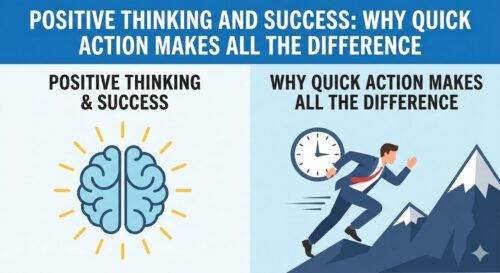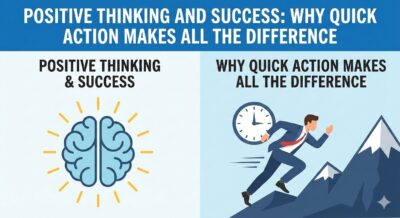The Psychology of Success: How Positive Thinking, Strategic Action, and an Unbreakable Mindset Lead to Lasting Achievement
Introduction: In the world of personal development and achievement, one question echoes louder than any other: What separates the truly successful from everyone else? While talent, luck, and hard work play a part, the most consistent answer lies in something far more fundamental: their mindset. Successful people don’t just work hard; they think differently. They cultivate a powerful internal landscape of positive thinking, resilience, and strategic action that allows them to overcome obstacles, create opportunities, and turn their dreams into reality. This comprehensive guide will explore the deep psychological and practical reasons why a positive mindset is the ultimate catalyst for success, from the words they use to the actions they take.
1. The Mindset of the Victor: A Strategic Approach to Positive Thinking
Positive thinking for successful people isn’t about ignoring reality; it’s about reframing it. It’s a strategic tool they use to maintain focus, build resilience, and unlock their full potential.
- Reframing Challenges as Opportunities: Where most people see a problem, successful individuals see a challenge. A setback isn’t a sign to give up; it’s a stepping stone to growth. This mindset is rooted in the belief that every obstacle holds a hidden lesson or a new path to a better outcome. For example, a failed business venture isn’t a total loss; it’s a masterclass in what not to do next time. This positive reframe keeps them from falling into a spiral of despair and empowers them to learn and evolve.
- The Self-Efficacy Loop: A core component of a successful mindset is self-efficacy, the unwavering belief that “I can do it.” This isn’t just wishful thinking; it’s a powerful feedback loop. When you believe you can succeed, you are more likely to take action, and when you take action and see progress, your belief in yourself strengthens. This cycle of belief and action is a powerful engine that drives them forward, even when the path is uncertain.
- The Power of Affirmations: Successful people use language as a tool for creation. They don’t just think positive thoughts; they speak them into existence. Phrases like “I can,” “I will,” and “I am capable” are not empty words; they are affirmations that reprogram the subconscious mind. By consistently using this positive self-talk, they build a mental foundation that supports their goals and vision, making it easier to stay motivated and focused.
2. The Words That Shape Reality: The Secret Language of Successful Individuals
The words successful people use are not just random choices; they are powerful affirmations that shape their reality, create their opportunities, and fuel their determination.
- “Growth” and “Learning”: The most successful people are not defined by their achievements but by their commitment to growth. They view every experience, good or bad, as a chance to learn and evolve. The words “growth” and “learning” are central to their vocabulary because they represent a continuous journey of improvement. They are always seeking to expand their knowledge, acquire new skills, and push their boundaries.
- “Opportunity” and “Chance”: In the face of difficulty, a successful person doesn’t see a dead end. They see a chance or an opportunity. This reframing allows them to remain optimistic and open to new possibilities. They understand that breakthroughs often come from unexpected places and that a seemingly negative event can lead to a positive outcome. They actively seek opportunities, rather than waiting for them to arrive.
- “Resilience” and “Persistence”: Successful people understand that their journey is a marathon, not a sprint. The words “resilience” and “persistence” are their mantras. They embrace challenges and setbacks as part of the process and never give up on their goals. Their ability to bounce back from failure, learn from their mistakes, and keep moving forward is what ultimately sets them apart.
- “Goal” and “Action”: Successful people are not dreamers; they are doers. They are driven by a clear sense of purpose and are laser-focused on their goals. They understand that a goal without a plan is just a wish. Their language reflects this, as they constantly talk about actionable steps and measurable progress. They are not afraid to take quick, decisive action, knowing that even a small step forward is better than none.
3. The Action-Oriented Mindset: Why Success Demands Swift and Decisive Action
Positive thinking is the fuel, but action is the engine that drives success. Successful people understand that a great idea is useless without a plan and the courage to execute it.
- The Bias Toward Action: Successful people have a bias toward action. They don’t wait for perfect conditions or a guaranteed outcome. They take calculated risks and move forward, even when they are unsure of the result. They understand that a quick decision, even a wrong one, is often better than no decision at all. This mindset allows them to learn from their mistakes, adapt quickly, and maintain momentum.
- Embracing and Overcoming Failure: Failure is not a final destination for successful individuals; it’s a detour. They don’t fear it; they learn from it. When a project fails, they don’t wallow in self-pity. Instead, they analyze what went wrong, make adjustments, and try again. This resilience and ability to bounce back from setbacks is a key factor in their long-term success.
- Creating, Not Waiting: Unsuccessful people often wait for opportunities to come to them. Successful people create their own opportunities. They are proactive, innovative, and constantly seeking new ways to make their mark. They don’t rely on luck or fate; they create their own destiny through hard work, strategic planning, and unwavering determination.
- Consistency over Intensity: Success is not built on a few intense bursts of effort. It’s built on consistent, sustained effort over time. Successful people understand the power of momentum. They show up every day, put in the work, and stay committed to their goals, even when they don’t feel like it. This discipline and persistence are what ultimately separate the temporary successes from the lasting achievements.
4. Conclusion: Your Mindset as the Master Key to Lasting Success

The journey to success is a personal one, but the roadmap is universal. It is built on a foundation of positive thinking, strategic action, and unwavering resilience. Successful people have mastered the art of reframing challenges as opportunities, using language as a tool for creation, and taking swift, decisive action. They understand that their mindset is the most powerful asset they possess.
By adopting these principles, you can unlock your own path to success. Begin by consciously choosing positive words and thoughts. Learn to see setbacks as lessons, not failures. And most importantly, take action, even when you are afraid. Because in the end, success isn’t about having a perfect plan; it’s about having the courage to execute it.
